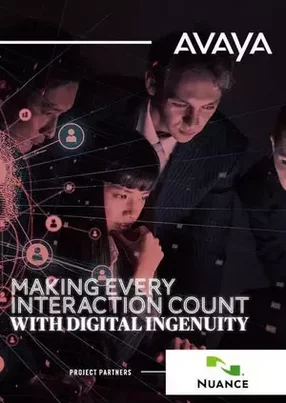Avaya: Where transforming an enterprise starts with transforming business communications
With audio conferencing, web conferencing, video conferencing, instant messaging, and more entering the fray, there are now many ways for businesses to communicate.
Needing to simplify this proliferation of new technologies, enterprises of all sizes are now turning their attention to new, innovative approaches like unified communication.
By allowing employees to send messages through one medium and receive the same communication on another medium, this integrated way of communicating aims to improve employee efficiency, effectiveness, workforce mobility, customer service and, ultimately, competitiveness.
Carving its path as a global leader in digital communications services, Avaya is all too aware of how technology can transform both communication and the customer experience alike.
With a far-reaching offering, the company strives to break down the barriers between disparate systems and seamlessly connect business stakeholders and customers.
Avaya’s product portfolio can be divided into three core areas – unified communications, cloud solutions, and customer experience and contact centers – and it’s clear they’ve been a hit, with Avaya solutions being used by 95% of all Fortune 500 companies.
Jean Turgeon, Vice President and Chief Technologist, says that the firm’s cutting-edge digital platform as well as its ability to integrate new technologies is helping it streak ahead of its competitors.
“We deliver an automated digital framework, which I describe as a puzzle with different pieces inclusive of an innovative communications platform,” explains Turgeon. “So, we have to take different technology innovations and we bring them all together to be able to transform and deliver a digital experience.
“We have a delivered an open architecture bringing together unified communication portfolio, a contact center portfolio, automated workflow capabilities with a high degree of sophistication, and we’ve demonstrated our ability to take other technologies, such as CRM from Salesforce, AI with Afiniti and more, tightly integrated within our ecosystem.”
Taking its cutting-edge portfolio further, Turgeon says that Avaya’s ability to integrate new technologies gives it a unique competitive edge as customers can use the portfolio but still keep up-to-date with the latest industry trends.
“It doesn't make a whole lot of sense for customers to build a next-generation digitally enabled platform that doesn’t unify communication technologies and have the ability to integrate new technologies such as the internet of things (IoT), AI, analytics and/or taking advantage of blockchain technology,” he says.
With research showing that the next decade will be marked by record IoT growth (some firms predict revenue will break into the trillions), Avaya is leveraging this innovation through its work in workflow automation.
For instance, by integrating with IoT technologies, Turgeon believes the system could successfully alert authorities to the breakout of a fire.
“We can connect our portfolio very easily to IoT platforms, so that when IoT platforms trigger events that we can automate workflow to notify the right people in real time. This creates a huge level of differentiation; by having this automated digital platform and the flexibility to integrate various technology altogether, it puts Avaya in a very good position from a competitive point of view.”
Using its communication services, Avaya can respond to events detected by IoT technology and notify the right people in real-time. This means that, with its API integration, Avaya can make IoT data actionable, and holistically solve business problems for customers.
With virtual reality, chatbots and augmented reality becoming the norm, artificial intelligence (AI) and machine learning have also become a common expectation for customers.
Turgeon says that AI will soon play an integral role in communication services today.
“You and I are communicating at this moment,” he tells me. “But if I was in my car, driving 70 miles per hour on a highway, the system wouldn’t able to retrieve any real-time contextual information to let you know that it’s not a good idea to establish a video call with me.
“Today we leave it up to the caller to make the decisions about how they should contact you. Artificial intelligence is going to become a key component in communication technologies, allowing systems to automatically determine what is the best modality of communication at a particular point in time.
“You no longer leave it to the caller. Now systems can blend that intelligence with machine learning capabilities, consuming all of this data and contextual information, and makes sense of that in real time.”
Artificial intelligence could also help contact centers use real-time coaching capabilities, whereby a skilled and experienced employee’s historical data can be used to give immediate feedback to another worker.
“If a customer is on a call and is unsatisfied we're able to provide assistance to a contact center agent in real time based on our sophisticated speech analytics platform,” describes Turgeon. “This allows the ‘machine’ or a supervisor if escalated to be able to both give information to the agent, suggest other ideas on how to handle the situation, or even trigger an event to a supervisor to come and assist you.”
By combining its communication services with APIs, the opportunities for Avaya are endless. This is not only beneficial for the company’s bottom line but it could also help transform people’s lives.
Fraudulent calls and scams are a dark cloud for many customers and businesses alike but Turgeon believes Avaya is pushing the envelope with its latest innovations.
As part of the Avaya Mobile Experience, the company is working on Identity-as-a-Service (IDaaS) which will reduce the risk of identity fraud by using contact centers to verify the customer’s validity through the use of biometrics.
See also:
- Interview: The digital journey of the University of Tasmania
- How Union Insurance has embraced digital innovation and met demands for instant insurance services
- GroupM delivers unrivalled insight through [m]PLATFORM
“I can eliminate the three to five security questions that someone may ask to determine your identity if the confidence factor is high,” Turgeon explains. “That's time wasted by the agent. We're hearing from various industries that they're spending around 40 to 75 seconds on average just trying to identify the caller. This really helps to improve the customer experience.”
In many of the real-life cases Turgeon discusses – resolving customer complaints or alerting people to fires and other incidents – time is critical. Therefore, the real-time nature of Avaya’s portfolio is one of its fundamental traits.
“If you're unhappy with your service at a hotel, for example, and you tweet about it it's better if the business is able to react immediately,” notes Turgeon. “Anything other than real-time or near real-time communication is just not good enough anymore.
“So, we have to start leveraging much more sophisticated capabilities to be able to transform the experience right now. You don’t want to lose a customer who could contact a different organization to do business with. I have to react to any issues immediately in real time.
“By the same token, if someone is having a heart attack or there’s an incident such as a fire or a gas leak, time is of the essence. The real-time aspect of a next-generation digital platform that integrates real-time contextual information is extremely important, regardless of which use cases you look at.”
Building on its current platforms and exploring recent improvements in AI and machine learning, Avaya is working to bolster the AI ecosystem with its new initiative, A.I Connect.
Bringing technology vendors and strategic partners together, the forum aims to speed up the development and application of AI technologies in contact centers and unified communications for Avaya customers.
“Through A.I Connect we have collaborated with companies such as Salesforce, who is a global leader in CRM, as well as other companies like Afiniti,” adds Turgeon. “Afiniti offers AI assisted pairing between the customer and the agent to make sure that the customer is redirected to the person that is most likely to help them.”
In the digital era, every interaction, whether direct or indirect, represents an opportunity to deepen customer relationships. By diving into ground-breaking innovations and offering seamless communication experiences, it seems Avaya is making sure that every opportunity counts.
“From my viewpoint, some of the use cases of our technologies are helping businesses be more attractive and profitable, whilst others are tied to transforming cities, communities, and the type of services that they can offer to their community,” notes Turgeon.
“It's about connecting the world in real time, with the right data, and I think this is the technology that we will continue to invest in.”


